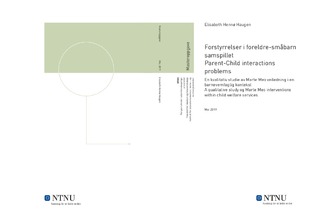| dc.contributor.advisor | Bania, Elisabeth Valmyr | |
| dc.contributor.advisor | Samsonsen, Vibeke | |
| dc.contributor.author | Haugen, Elisabeth Hennø | |
| dc.date.accessioned | 2019-09-19T14:01:33Z | |
| dc.date.issued | 2019 | |
| dc.identifier | no.ntnu:inspera:38653262:43313706 | |
| dc.identifier.uri | http://hdl.handle.net/11250/2617786 | |
| dc.description.abstract | Sammendrag
Dette er en masteroppgave i barn og unges psykiske helse. Målsettingen er å få et innblikk i hvordan foreldre opplever at Marte Meo veiledning, i en barnevernkontekst, kan gi endring i samspill med eget barn.
Metode: På bakgrunn av problemstillingen har jeg har valgt en kvalitativ metodisk tilnærming, med en konstruktivistisk forankring. Datamaterialet består av semistrukturerte intervju med seks foreldre som har mottatt Marte Meo veiledning i regi av kommunal barneverntjeneste. Intervjuene er transkribert og analysert ut fra Braun og Clarke sin tematiske analysemodell.
Teori: Funnene er drøftet i lys av systemisk teori, maktteori, motivasjonsteori, salutogenese og utviklingsteori.
Funn: Marte Meo veiledning i en barnevernkontekst syntes mest nyttig for de foreldrene som selv tok initiativ til veiledning. Denne studien indikerer at når barnevernet foreslår veiledning vil foreldre kunne trenge mer tid i veiledningsløpet, både for å bli trygg og komme i posisjon til endringsarbeid. Alle de intervjuede foreldrene opplevde Marte Meo metoden sin bruk av film som virkemiddel som svært nyttig for å se barnets behov. Foreldrene uttrykte at de via film oppdaget seg selv som bedre foreldre enn de i utgangspunktet trodde de var.
Konklusjon: Funn fra denne studien kan gjøre oss veiledere oppmerksom på at konteksten barnevern kan være en viktig påvirkningsfaktor som må kommuniseres og behandles åpent i veiledningsforløpet til foreldrene. Kontekstens makt ser ut til å påvirke trygghet i veiledning, motivasjon og veiledningstid. Tid kan være en viktig faktor, og en konsekvens av å ikke ta dette opp er at en ikke kommer til ledeprinsippet i Marte Meo. Film som katalysator gir økt forståelse for barnets behov og for å se egen påvirkning på barnet. Det syntes som at økt forståelse for barnets behov og økt innsikt i egen påvirkning for å støtte barnet, gjorde foreldrene tryggere i foreldrerollen. Komponentene trygghet i foreldrerollen, å bekrefte barnets følelser og opplevelsen av mestring i hverdagsøyeblikk, er faktorer som disse foreldrene fremhevet styrker relasjonen mellom dem og barnet. Det gir også en opplevd lettere hverdag.
Nøkkelord: Marte Meo metoden, veiledning, barnevern, foreldre- barn, samspill, foreldres erfaring, makt. | |
| dc.description.abstract | Abstract
The following is a Master's thesis regarding mental health in children and adolescents. The aim of this paper is to explore how parents experience changes in their interactions with their children after Marte Meo intervention provided in the context of child welfare services.
Methods: To answer my research question I have chosen a qualitative methodology with a constructivist approach. The collected data consist of semi-structured interviews of six parents who participated in Marte Meo intervention provided by child welfare services. The interviews have been transcribed and analyzed based on Braun and Clarke's thematic analysis.
Theory: The findings are discussed in relation to systemic theory, power theory, motivational theory, salutogenesis, and developmental theory.
Findings: Marte Meo intervention in the context of child protective services seemed to benefit those parents who themselves sought supervision the most. The findings indicate that the parents within the child welfare context need more time of the intervention in order to feel safe and gain readiness for change. The participants experienced the usage of video as very helpful in terms of being able to identify their children's needs, and recognize themselves as better parents.
Conclusion: Findings in this study can help to raise awareness about the importance of context of intervention in child welfare services, and the need to communicate in a clear and transparent manner during the course to the parents. The power of context seems to influence the perceived safety of, motivation for and duration of supervision. Those parents who themselves requested supervision seemed to be more ready for the work required, and thus required less time, than those needing time to build motivation in order to make use of the intervention. Time can be a crucial factor, and is crucial for getting to the leading principle in Marte Meo intervention. Video usage acted as a catalyst for gaining increased understanding regarding the children's needs and realizing how they themselves influenced the child. Components including gaining safety in the role as a parent, learning to validate the child's emotions and experiencing mastery in every-day situations were all highlighted by the participants as helpful in strengthening the bond between them and their child. This also affected parental daily life positively.
Keywords: Marte Meo method, intervention, child welfare services, parent-child, interaction, parent's experience, power. | |
| dc.language | nob | |
| dc.publisher | NTNU | |
| dc.title | Forstyrrelser i foreldre-småbarn samspillet | |
| dc.type | Master thesis | |
